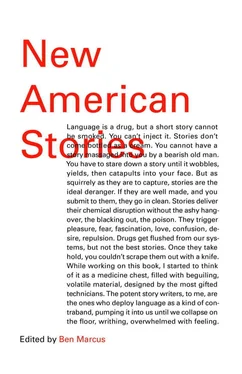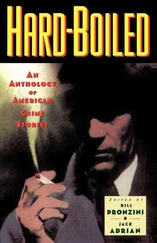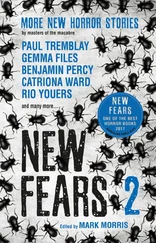— Let’s go, he said.
Carr nodded to Lubeck’s stepfather. Then away.
It was the same automobile. The sack had not stopped all the blood from coming out of the head the day before, and the backseat was stained.
— I’ll drive, said Carr.
Brennan was singing beneath his breath. Carr could not make out what it was. They passed along the streets, over the bridge, out of the town, through fields on the raised road, and again there loomed up the specter of the track, the car through the bare trees, the waiting men beside it.
— How did this happen, said Brennan quietly.
— It’s happening, said Carr.
— What’s right? said Brennan. If I kill him, then his wife will have lost her husband and her child.
— You can’t think about that, said Carr.
— Maybe I’ll shoot him in the leg, said Brennan. Then it’ll stop.
—
The pistols were laid out on the hood again, on the same cloth.
— Which one did Lubeck take? whispered Brennan.
— I don’t remember, said Carr. They look the same.
— They are the same, said the Judge’s second.
— They are not the same, said Brennan. One worked yesterday and the other didn’t.
— Are you suggesting—
— No, no. I’m sure both revolvers fired, and accurately. That’s not what I’m saying. But one worked. Which one was it?
The Judge heard the argument and came over.
— What’s the trouble? he asked.
— He wants to know which gun was yours.
The Judge pointed to the left one. Brennan took it.
The marks were still on the track from the day before, but the Judge’s second redrew them anyway, with a broken stick. He smoothed over the place where Lubeck fell. He motioned to Carr.
— This goes the same way.
— I’ve explained it to him, said Carr.
— Right.
Carr nodded to Brennan, who was holding the pistol in both his hands with the barrel pointed down. Brennan walked slowly to the line.
— No, said Carr. You have to be back a bit.
— Oh, said Brennan. I’m sorry, I forgot. His hands were shaking.
The Judge stood well behind his line. He nodded to his second. His second nodded to Carr.
— Ready? Carr asked Brennan.
Brennan’s face was curled up. He shook it a little, enough for a nod.
— Now.
The Judge advanced to his line. Brennan stayed where he was.
The Judge raised the revolver and pointed it at Brennan. Brennan raised his pistol. He was still holding it with both hands. The gun shook uncontrollably.
— Come forward to the line, shouted the Judge’s second. He turned to Carr. He’s got to come forward.
— Brennan, go to the line, said Carr. Brennan looked around uncertainly.
— To the line.
He started to walk forward, his pistol held out before him.
The Judge’s gun was pointed at Brennan. He held it carefully and squeezed. The sound came and was gone. It seemed to pass along over the ground, to catch at Brennan and throw him down, and then disperse.
Brennan was coughing and holding his chest. Blood was all on his mouth. He kept wiping it away, but the mouth stayed bloody. There was always more blood and more blood on the mouth.
— Leon, he said. Leon.
Carr knelt by him. The bullet had entered Brennan’s chest and pierced his lung. His mouth was full of blood. Blood was on his face and neck, on his hands. He was still holding the pistol. Carr took it from him and put it on the ground.
— Frank, he said. Frank, you’re all right.
— I’m all right, said Brennan.
— Just hold it together. We’ll get you to a hospital.
— No one’s getting to a hospital, said the Judge’s second. Carr stood up.
— He’s had a bullet through his chest. Isn’t that enough for you? I’m taking him to a hospital, and you won’t stop me.
— I certainly will, said the Judge’s second. He took the pistol up off the ground and held it very seriously in his hand.
A minute passed. Then another. Brennan’s coughing was quieter now. Carr started toward the car.
— I’m going to get help. I don’t care what you say.
— It’s useless to talk about it, said the Judge, approaching. He’s dead already.
And indeed Brennan’s chest had stopped moving.
— This, for you, said the second, handing Carr an envelope. James Harp, it read.
All around them the morning squatted unwelcoming with long trails of foiling distance.
The Judge and his second were standing together and speaking quietly.
What could they possibly be saying?
— James, he said. James, he said again, louder, banging on the door.
He could hear the sound of someone moving around inside.
— Harp, you bastard, open the door.
The door opened. Harp stood there in a dressing gown. He was a mess. His face was still swollen up.
— What do you want? he said.
— They’re both dead.
— You think I don’t know that?
Carr stood there. He couldn’t say anything. He tried to, but he couldn’t. He was just standing there, holding the envelope. He refused to look at it. He was not holding an envelope. He would not look at it.
He looked down at the envelope.
— What’s that? said Harp.
— What?
— What are you holding? Carr, what’s that in your hand?
Carr was standing there with the envelope after all. He handed it to Harp.
— It has my name on it. What, you were just standing there with an envelope with my name on it and not saying anything? You got it from them, didn’t you? They send you along each day, their messenger. What is that? If you were my friend, you’d have thrown it away. Now I have to see it. Now I have to do something.
— Well, do something, said Carr.
Harp tore open the envelope. A girl came out from his room.
— What’s that? she said.
— Nothing, said Harp.
— Give me that, she said. Give it to me. She tried to take the envelope from Harp. He twisted away. She tore it out of his hands and ran back into the room.
— Come back here!
Harp ran after. Carr followed.
There was a fireplace in the far corner. The girl was standing in front of it. The letter was gone.
— It doesn’t make a difference, Alice.
— What do you mean? she said. Harp said nothing.
— What does he mean?
— I don’t know.
— You know, damn you. Tell me what he means.
— He means he knows what the letter said, even if he didn’t read it. There’s nothing to be done.
She shrieked and started pounding on Harp’s chest and face with her hands.
— No! You’re not going. You’re not going.
Harp looked over her at Carr. His features had composed themselves.
— Tomorrow morning? he said. Carr nodded.
—
Out on the street there was a dandy parade in progress. Little boys were dressed up in bright blue soldier suits and carrying little guns and swords and such. Others were with trumpets and bugles, some with drums. It was quite a clatter. There were adults too, in adult versions of the ridiculous child uniforms, walking at the front. There was a banner too, but the banner was already gone up ahead, and Carr could not read what it said.
The parade was going in the direction that Carr needed to go. Should I join the parade? he wondered.
That’s always the decision one is pressed to make. Do I join the parade or not? In certain cases the decision is easy, in others not so.
Now there was a mule with a very small child on it dressed up also like a mule. Or rather like a monk in a hair shirt.
A hair shirt, thought Carr. I haven’t seen one of those in a long time. Yes, these and other thoughts of guilt.
After the mule came four dancers bent up and twisted onto each other to look like an elephant. They were very successful in this. I imagine they were the best ones in the world at being in a parade and looking like an elephant. Even if everyone were to try to do it, they would still be the best, that’s how good they were. I wouldn’t want you to think that just because no one ever bothers trying to look like an elephant with other people together in a parade that these people being the best didn’t mean much because certainly it did. They were pleasant to look at, dragging their way along the street. One had an arm to be the trunk, and it was painted gray like a trunk, and all the hair had been shaved from it. It moved back and forth the way an elephant trunk moves, always seeming like it was about to investigate some smell or shape. The people who made up this elephant were determined. It must have hurt a great deal to go all the way through the town on the hard pavement.
Читать дальше










![Женя Джентбаев - neo futura [stories]](/books/692472/zhenya-dzhentbaev-neo-futura-stories-thumb.webp)

